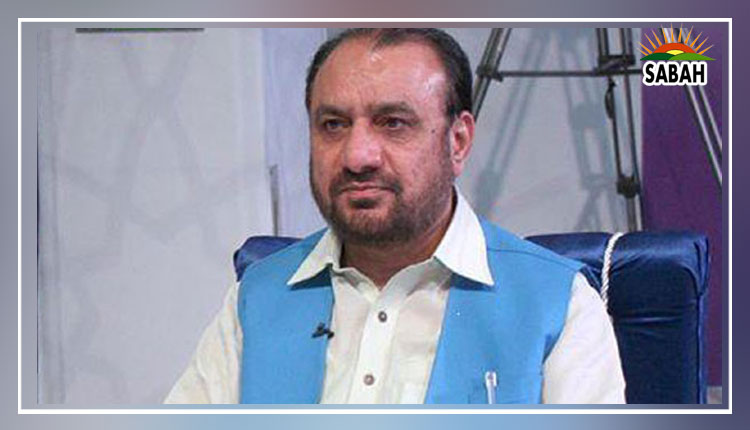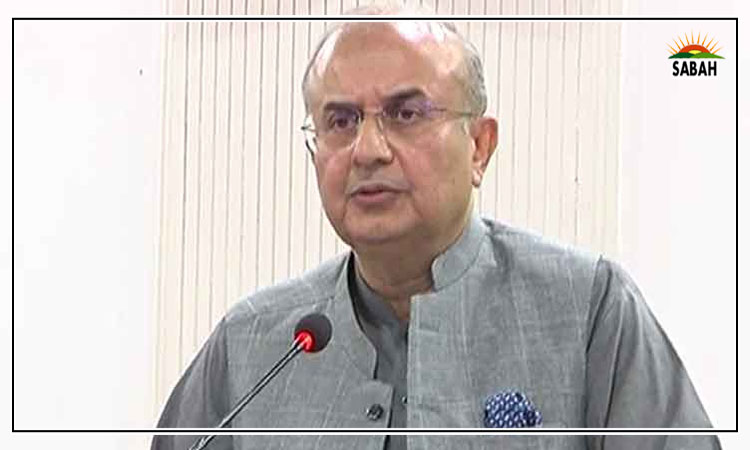Justice Syed Mansoor Ali Shah stresses the importance of implementing the top court’s verdicts
ISLAMABAD, August 10 (SABAH): Supreme Court of Pakistan’s senior puisne Judge Justice Syed Mansoor Ali Shah has stressed the importance of implementing the top court’s verdicts, saying that there is no option to “disregard or delay” the judgments.
“The SC verdict [legal] cannot be disregarded or delayed or else the entire legal system will be disrupted and the balance of Constitution will be out if you seek non-implementation of judgments,” Justice Syed Mansoor Ali Shah said Saturday while addressing an event in Islamabad.
“I want to underline that Supreme Court’s judgments [always] get implemented and it is the structure of the Constitution,” Justice Syed Mansoor Ali Shah said, stressing that there has never been a case where an apex court verdict was not implemented.
He said that not implementing the SC rulings would be “a violation of the Constitution”. “There is no choice but to comply with the Supreme Court’s orders,” he added.
The SC judge further stated that implementation of judgments was the structure of Constitution as the top court draws the authority to decide the matters from the Constitution, which is the supreme law of the land, instead of any other document
“No one has the choice to call it [SC rulings] ‘wrong’ or ‘not right’. The Constitution says that this is a judgment and it has to be implemented,” he said.
Justice Syed Mansoor Ali Shah went on to say that those who have any objection to the Supreme Court’s verdict can change the entire structure of the Constitution “but right now this is how it is”.
He said that disregarding the apex court’s rulings was also “against the separation of powers”. “Separation of powers is the core component of democracy which shouldn’t be disturbed. This is not a burden or a courtesy that you have to do, but a constitutional obligation that needs to be fulfilled.
“This is a delicate equilibrium which needs to be respected. We have an obligation to keep this equilibrium in balance and there shouldn’t be any executive overreach. No one has the choice or the prerogative to second guess if the judgment is right or wrong,” the Justice Syed Mansoor Ali Shah said.
He said that only SC had the prerogative to decide a matter and after that the judgment has to be implemented. There will be severe consequences if the constitutional duty of implementing the SC’s orders is not fulfilled, he added.
“Any verdict cannot be disregarded or delayed otherwise you will uproot the entire legal system and you will upset the balance of the Constitution if you set out on this track that judgemnts should not be implemented. This is not possible.”
He also said that such an action would be against the separation of powers of state organs and also disbalance it. “Separation of powers is a core component of democracy and it should not be disturbed.”
Justice Syed Mansoor Ali Shah said that to implement court orders was not a “courtesy” or a “burden” but was a “responsibility and constitutional obligation that you have to follow”. He pointed out that there was a “delicate equilibrium” in the Constitution between state organs which should be respected.
“It is our obligation to maintain this balance and there should be no executive overreach of any kind. No one has the choice or prerogative to second guess a judgment if it is right or wrong. The prerogative is of the Supreme Court and once it makes an order, it has to be implemented. That is the system of this country and the Constituion of this country. If you want to make a new system then first do so and then we will talk about it.
“It is completely clear that [implementing court verdicts] is a constitutional duty and it has severe consequences if you don’t implement.”
“I was called the acting chief justice of Pakistan. It is not true. I am the senior most judge, not the chief justice,” he said. He added that Qazi Faez Isa is the sitting chief justice of Pakistan and he is very good friend of him. Justice Mansoor Ali Shah said that minorities have equal rights both in Islam and Pakistan. “Our Holy Prophet (PBUH) had stopped to occupy the land of a church and gave rights to the Christians,” he said. The constitution of Pakistan also provides protection to minorities and Articles 21, 22, 23 and 25 address this subject, he added.
According to Justice Mansoor Ali Shah, Quaid-e-Azam Muhammad Ali Jinnah also emphasised over the rights of minorities living in Pakistan. “The Supreme Court has also ruled that all the citizens enjoy equal rights,” said Justice Syed Mansoor Ali Shah.












